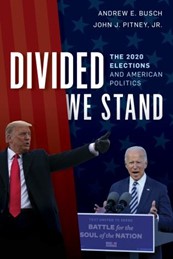Our new book is titled Divided We Stand: The 2020 Elections and American Politics. Among other things, it discusses the state of the parties. The state of the GOP is not good. Trump and his minions falsely claimed that he won the election, and have kept repeating the Big Lie.
At AP, Nicholas Riccardi reports on GOP efforts to control election administration:
In battleground states and beyond, Republicans are taking hold of the once-overlooked machinery of elections. While the effort is incomplete and uneven, outside experts on democracy and Democrats are sounding alarms, warning that the United States is witnessing a “slow-motion insurrection” with a better chance of success than Trump’s failed power grab last year.
They point to a mounting list of evidence: Several candidates who deny Trump’s loss are running for offices that could have a key role in the election of the next president in 2024. In Michigan, the Republican Party is restocking members of obscure local boards that could block approval of an election. In Wisconsin and Pennsylvania, the GOP-controlled legislatures are backing open-ended “reviews” of the 2020 election, modeled on a deeply flawed look-back in Arizona. The efforts are poised to fuel disinformation and anger about the 2020 results for years to come.
In Pennsylvania, the GOP-controlled legislature is undertaking a review of the presidential election, subpoenaing voter information that Democrats contend is an unprecedented intrusion into voter privacy. Meanwhile, Trump supporters are signing up for local election jobs in droves. One pastor who attended the Jan. 6 rally in the nation’s capital recently won a race to become an election judge overseeing voting in a rural part of Lancaster County.
In Michigan, the GOP has focused on the state’s county boards of canvassers. The little-known committees’ power was briefly in the spotlight in November of 2020, when Trump urged the two Republican members of the board overseeing Wayne County, home to Democratic-bastion Detroit, to vote to block certification of the election.
